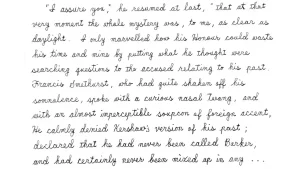新たな謎 #26『隅の老人』対訳
The Old Man in the Corner
"A fresh mystery had cropped up.
The Old Man in the Corner
「新たな謎が見つかりました」
Who, then, had made the assignation with William Kershaw at Fenchurch Street railway station?
「誰が、その時、フェンチャーチ・ストリート駅でウィリアム・カーショーと密会していたのでしょう?」
The prisoner gave a fairly satisfactory account of the employment of his time since his landing in England.
「被告人は納得のいく説明をしました。彼がイングランドに上陸してからの活動についての」
"'I came over on the Tsarskoe Selo,' he said, 'a yacht belonging to a friend of mine.
『私は友人のヨットでやって来ました』
When we arrived at the mouth of the Thames there was such a dense fog that it was twenty-four hours before it was thought safe for me to land.
『私たちがテムズ川の河口に到着した時、とても濃い霧が出ていたので、上陸するのに安全だと判断するまで24時間かかりました』
My friend, who is a Russian, would not land at all; he was regularly frightened at this land of fogs.
『私の友人のロシア人はまったく上陸したがりませんでした。
彼はこの霧の陸地におびえていました』
He was going on to Madeira immediately.
『彼は直ぐにマデイラに行くつもりでした』
"'I actually landed on Tuesday, the 10th, and took a train at once for town.
『私が実際に上陸したのは、10日の火曜日で、すぐに列車で街へ向かいました』
I did see to my luggage and a cab, as the porter and driver told your Honour; then I tried to find my way to a refreshment-room, where I could get a glass of wine.
『ポーターとドライバーが裁判長に証言した通り、私は自分の荷物を預けました。それから、私は休憩室を探しました。そしてそこで、私はワインを一杯飲みました』
I drifted into the waiting-room, and there I was accosted by a shabbily dressed individual, who began telling me a piteous tale.
『私は待合室に立ち寄りました。そしてそこで、私はみすぼらしい服装の人に声をかけられました。その人は私に哀れな話を話し始めました』
Who he was I do not know.
『彼が誰だったのか、私は知りません』
He said he was an old soldier who had served his country faithfully, and then been left to starve.
『彼が言うには、自分は故郷のために働いた老兵で、ひもじい思いをしているそうです』
He begged of me to accompany him to his lodgings, where I could see his wife and starving children, and verify the truth and piteousness of his tale.
『彼は私に、自分の宿へ同行してほしいと懇願しました。
そうすれば、そこで私は彼の妻と、お腹を空かせた子供たちに出会い、彼の話の悲痛さと真実を確かめることができるだろうと』
Reference : The Old Man in the Corner by Baroness Orczy(project gutenberg)
English – Japanese parallel text, handwriting-based foreign language learning


